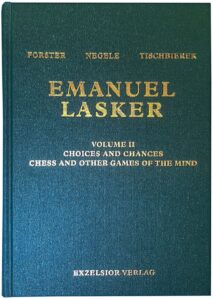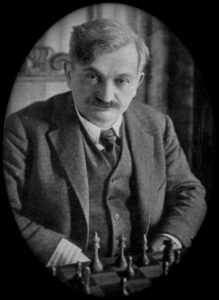Choices and Chances: Chess and Other Games of the Mind

Richard Forster, Michael Negele, Raj Tischbierek (eds.)
xii + 452 pages
Exzelsior Verlag, Berlin, 2020
ISBN 978-3-935800-10-5
To the publisher’s order page.
Read an extract from volume II.
In this second volume, Mihail Marin and John Donaldson shed new light on some of Lasker’s most important encounters in the middle part of his chess career, starting with the famous tenth match game against Carl Schlechter and culminating in his famous victory at New York 1924. Richard Forster examines the bitter aftermath of this pivotal event, which contributed to Lasker’s subsequent long withdrawal from chess.
The volume also offers an in-depth view of Lasker’s dedication to various mind games beyond chess, with expert analysis of his achievements and contributions to Go and bridge by Theo van Ees/Christian Wohlfarth and Bob van de Velde. Wolfang Angerstein contributes a detailed essay of Lasker’s own board game Lasca, with an appendix on checkers and Salta, and Lasker’s contributions to the fledgling field of game theory are lucidly exposed by Jörg Bewersdorff. Finally, Lasker’s life in the United States and Berlin between 1902 and 1914, as well as his later years in Holland, are covered with many new biographical insights by Michael Negele, Richard Forster, and Bob van de Velde, with a special contribution by Floribert Baudet on Lasker’s unique friendship with the mathematician Han Baudet.
Contents
- A Biographical Compass, Part II, by Michael Negele & Richard Forster
- Lasker in Holland by Richard Forster, Michael Negele & Bob van de Velde, with an Appendix by Floribert Baudet
- Lasca—A Strategic Mind Game by Wolfgang Angerstein
- Lasker and Go by Theo van Ees & Hans-Christian Wohlfarth
- Lasker as a Bridge Expert by Bob van de Velde
- Emanuel Lasker and Game Theory by Jörg Bewersdorff
- The New York 1924 Tournament by John Donaldson
- The New York Controversy by Richard Forster
- Emanuel Lasker—The Man to Beat by Mihail Marin
Authors
Dr. Wolfgang Angerstein, born 1958, works as a medical doctor and teaches as a professor at the University Hospital in Düsseldorf. He collects chess books and chess pieces as well as other strategic board games such as Lasca, Salta, and East Asian chase games. In 2002, he contributed an expert article on Lasca to the magazine Board Game Studies (no. 5, 2002, pp. 79–99).
Dr. Floribert Baudet, born 1971, teaches military history and strategy at the Netherlands Defense Academy in Breda. He is a member of the faculty board and has published on various topics, including former Yugoslavia, Dutch Cold War foreign policy, strategic communication and propaganda, and intelligence. Books
include Het heeft onze aandacht (2001), Officieren aan het woord (2007), Het vierde wapen (2013), and Perspectives on military intelligence from the Great War to Mali (2017).
Dr. Jörg Bewersdorff, born 1958, lives in Limburg, Germany. He received his Ph.D. in mathematics in Bonn in 1985 under the supervision of Günter Harder. He is the general manager of a gaming and gambling company and the author of several textbooks on probability theory, mathematics of gambling, and game theory. His main work Glück, Logik und Bluff: Mathematik im Spiel (1998) has seen its seventh German edition in 2018 and has appeared in English as Luck, Logic, and White Lies: The Mathematics of Games (2005).
John Donaldson, born 1958, is an International Master in Berkeley and former chess director of the Mechanics’ Institute in San Francisco. He was co-editor and contributor to Inside Chess, Players Chess News, and Northwest Chess, a longtime captain of the American national team, with which he won the 2016 Olympiad in Baku, and a former United States zonal president. Author of over thirty chess books, including Akiba Rubinstein (2 vols., 1994/2006 and 1995/2011) and several acclaimed works on Bobby Fischer (1994, 1995, 2005, 2020).
Theo van Ees, born 1947, is a retired information specialist and lives in Leiden. He learned to play Go in 1974, reached 1st dan in 1983, and is arguably the World’s foremost collector of everything on Go in Western languages. He gave talks on various international Go conferences and had several articles published in the Dutch and British Go magazines as well as in the World of Weiqi. Co-author, with Franco Pratesi, of bibliographical works on Go (Bibliogo and Periodigo) as well as EuroGo, vol. 1, an account of the early history of Go in Europe.
Dr. Richard Forster, born 1975, lives in Winterthur. He is an international chess master with a doctorate in computational linguistics and works as a consultant in data engineering. He has authored several chess books, including Amos Burn (2004) and The Zurich Chess Club (2009/2011). He was one of the editors of Emanuel Lasker—Denker, Weltenbürger, Schachweltmeister (2009) and is the technical editor of the present series. He has represented Switzerland in six Chess Olympiads.
Mihail Marin, born 1965, is a chess grandmaster living in Bucharest. He is a three-time champion of Romania and has represented his country in a dozen Chess Olympiads. He has made himself a name as an author of well-received opening books as well as numerous treatises on games of past, including Secrets of Chess Defence (2003), Learn from the Legends (2004; 3rd ed. 2015), Secrets of Attacking Chess (2005), Old Wine in New Bottles (2019), Learn from Bent Larsen (2022), and Vladimir Simagin (2022).
Dr. Michael Negele, born 1957 in Trier, lives in Lübeck. He holds a doctorate in chemistry and has been retired since 2017. He is the author of over 70 articles on topics of chess history for the magazines Kaissiber, KARL, and Schach. He contributed a detailed review of record-breaking achievements in blindfold chess
for the book Schauspiel des Geistes (2012). Together with Regina Magacs he co-authored the bilingual biography A Winning Formula (2017) on the latter’s father, Paul Felix Schmidt. He was the project manager and co-editor of Emanuel Lasker—Denker, Weltenbürger, Schachweltmeister (2009), as well as the present series.
Robert (Bob) van de Velde, born 1937, lives in Amsterdam. He was a lecturer in Dutch Language and Literature at Aarhus University (Denmark) and head of Bibliography and Documentation for Dutch literature at the University of Amsterdam. Later, he managed several care institutes in Amsterdam. In the 1960s and 1970s he won three international bridge tournaments and the Danish Bridge Cup. He wrote on bridge for various papers (Telegraaf, Volkskrant, and NRC Handelsblad) and was chief editor of the Dutch magazine Bridge. He is the current chairman of the Chess History and Literature Society and principal advisor of the Mind Sports Collections of the Netherlands at the “Tresoar” in Leeuwarden, which accommodates the world’s largest collection of bridge literature.
Hans-Christian Wohlfarth, born 1955, works as an independent architect in Berlin. He was an active chess-player before making the acquaintance of Go in 1972. He reached the 4th dan, and in 1989 briefly headed the ranking of East German Go players but retired from tournament play in 1990. His first article on Lasker and Go appeared in the 2003 proceedings of the Lasker conference, Emanuel Lasker: Homo ludens—homo politicus.
